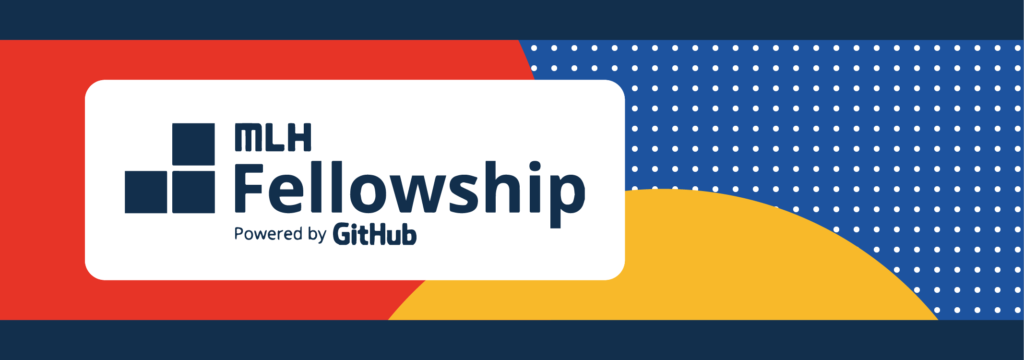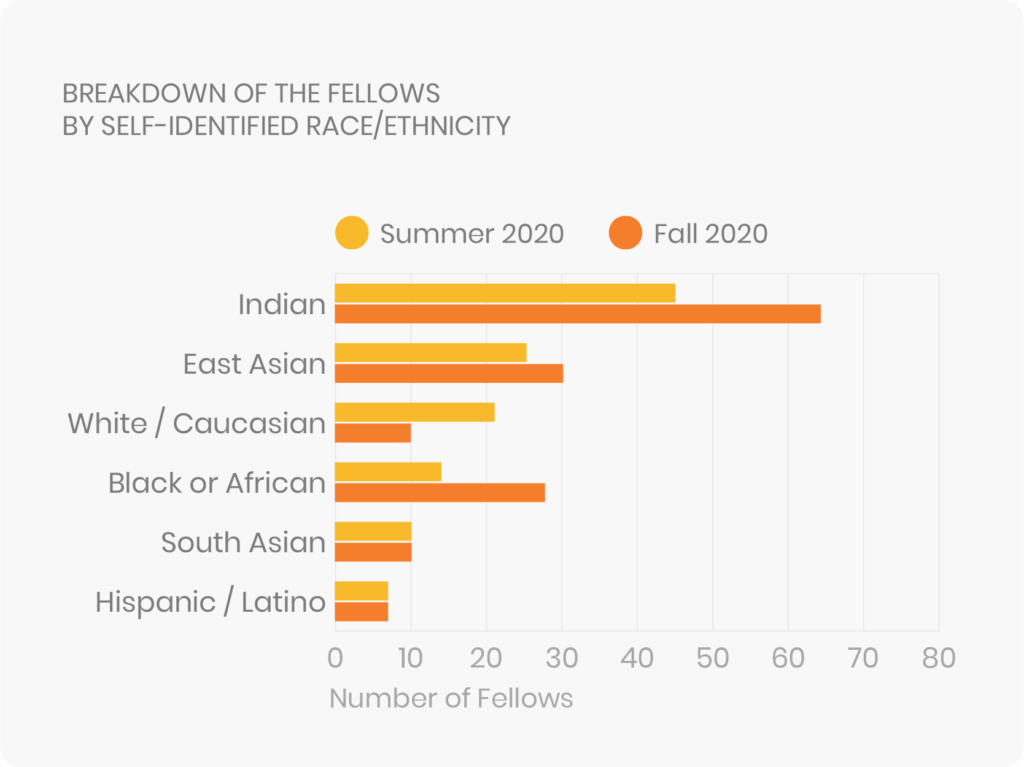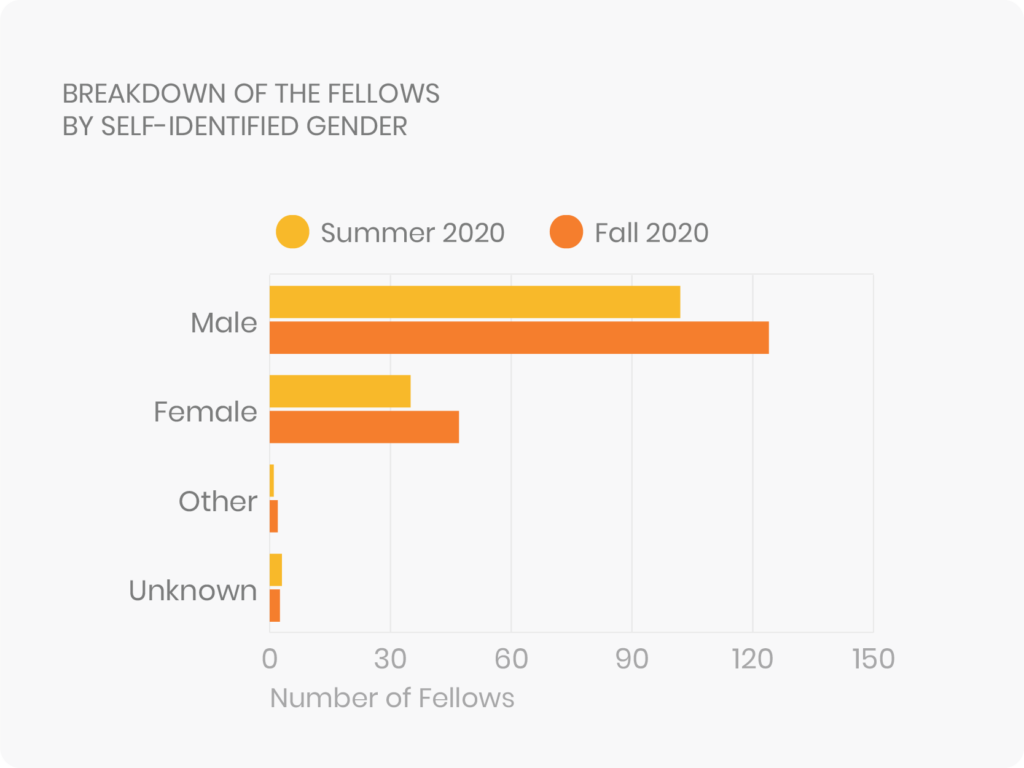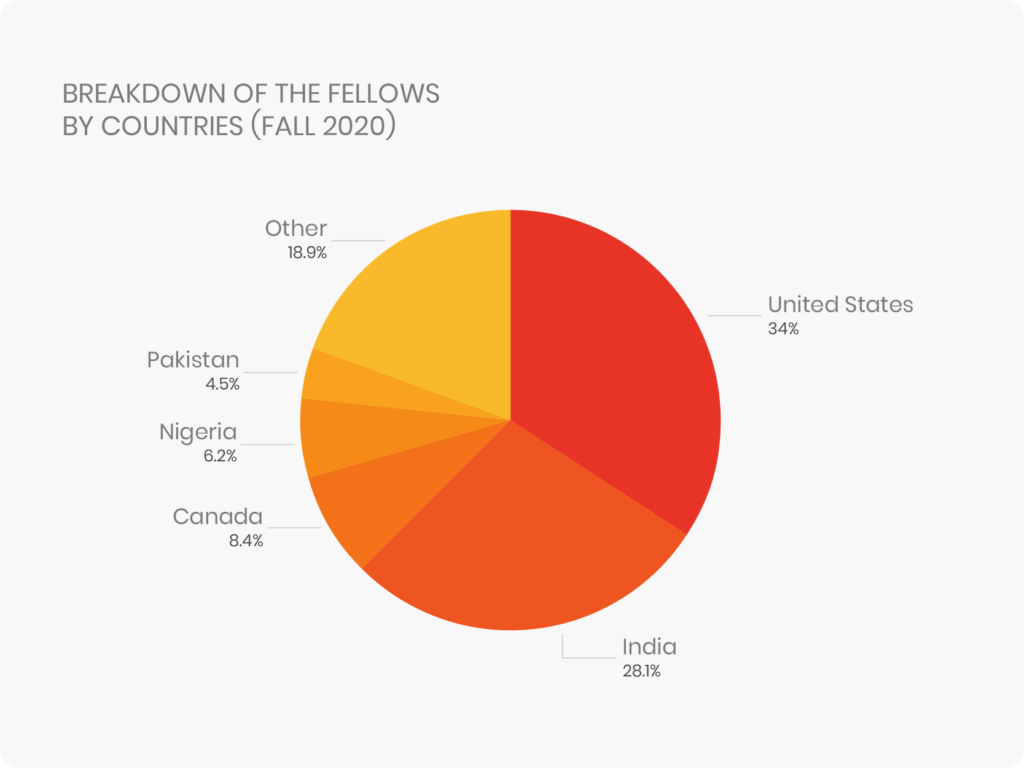Talent is evenly distributed but opportunity is not. That is why a core goal of the MLH Fellowship is to help under-represented technologists build their skills and confidence in an inclusive, supportive community of learners. In each iteration of the program, we take steps in the right direction with the support of our amazing partners.
Racial Diversity
In Fall 2020, we launched an experimental new program with Facebook to provide scholarships to hackers who identified as Black or of the African diaspora. We were able to give scholarships to 20 Fellows to help them pay for their costs of living and education while building their skills. These Fellows built and contributed to a wide variety of things from their own creations to major open source projects impacting millions of developers.
After announcing the program, we saw a noticeable uptick in applicants. We hope to build on this success by creating other specific opportunities like this for BIPOC individuals and others not typically represented in technology. Tech communities must both invite underrepresented developers to the party, and ask them to dance (Vernā Myers).
In the Fall, the MLH Fellowship increased the proportional representation of Black or African Fellows by 60% from the summer and saw a 109% increase in the actual number of Fellows from those backgrounds.
Gender Diversity
While MLH is looking deeply at the racial opportunity gap in tech, we have also placed a large emphasis on gender diversity as well. We actively strive to ensure that MLH is encouraging opportunities for genders not typically represented in tech such as female-identifying and gender-non-binary hackers.
In the 2020 season alone, 42% of hackers at our U.S. events identified as female or non-binary which is up 18% from 2019 and higher than the breakdown of gender in tech at large– 21% female in the United States. We strive to create welcoming opportunities and spaces in our community in several ways, one of which is by working with gender-inclusive organizations and hackathons. In the 2020 MLH hackathon season, we powered 16 hackathons focused on empowering underrepresented hackathons.
We recognize that there are factors that make it hard for women and non-binary hackers in different areas of the world to gain access to tech education and hackathons such as not being able to be out without supervision, spending the night at an event, etc. This is clear when we look at hackers outside of the United States participating in tech which is 10% less.
While this has been the main avenue in which we have worked to bridge the gender gap, we are working hard to see similar improvement within the MLH Fellowship. We have seen some small steps towards this between Fall 2019 2020 moving from 72% male to 66% male and 25% female to 30% female. We hope to see larger changes going forward. As it stands now, we are proud to know that the overall gender representation in the MLH Fellowship group is better than the U.S. Computer science enrollment averages (18-20%) and we aim to do even better with our next wave of enrollment.
Global Diversity
It goes without saying that the hacker community has continued to grow beyond borders. Through the power of virtual events, hackers worldwide have gotten access to tools, resources, and opportunities that were otherwise unavailable. The MLH Fellowship is no exception to this. By providing students with an internship alternative in the wake of the COVID-19 pandemic, our applicant pool drew in people from over 100 countries this past Fall.
Out of the more than 100 countries that applicants submitted from, we were able to accept Fellows from 28 of them. We hope that as the MLH Fellowship continues to grow, that we will be able to reach hackers in even more places and provide new and exciting opportunities to them.
Diversity is about more than race and gender though. MLH is constantly thinking about other areas of diversity like disability, socioeconomic status, and neurodiversity. One specific area we’re focusing on this Spring is educational diversity, seeking out talented developers who haven’t traveled the traditional Computer Science degree pathway. We’re excited to share more about this initiative in the future.
We continue to expand the reach and impact of the MLH Fellowship by increasing diversity in gender identity, race and ethnicity, and location. It is through the help of partners such as Facebook that we are able to continue working towards these goals and we can’t wait to see how diversity will continue to grow.
* All data from this piece is from the Fall 2020 MLH Fellowship Application and Acceptances



